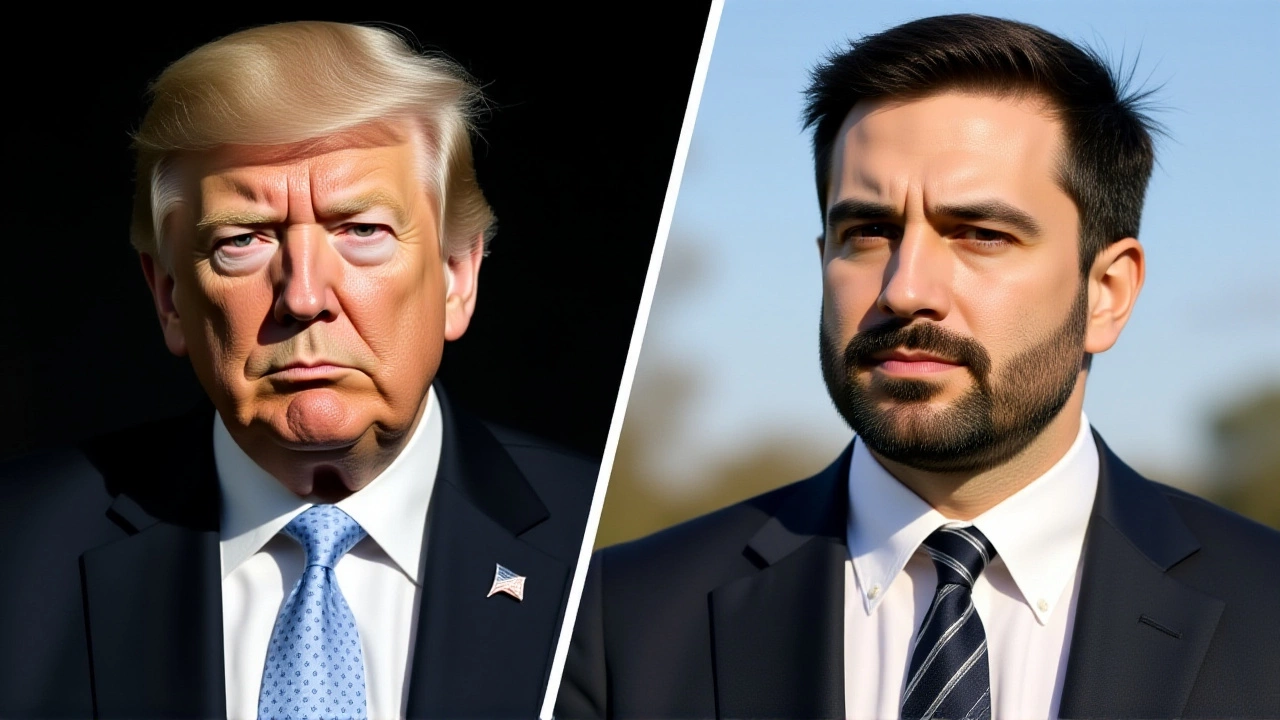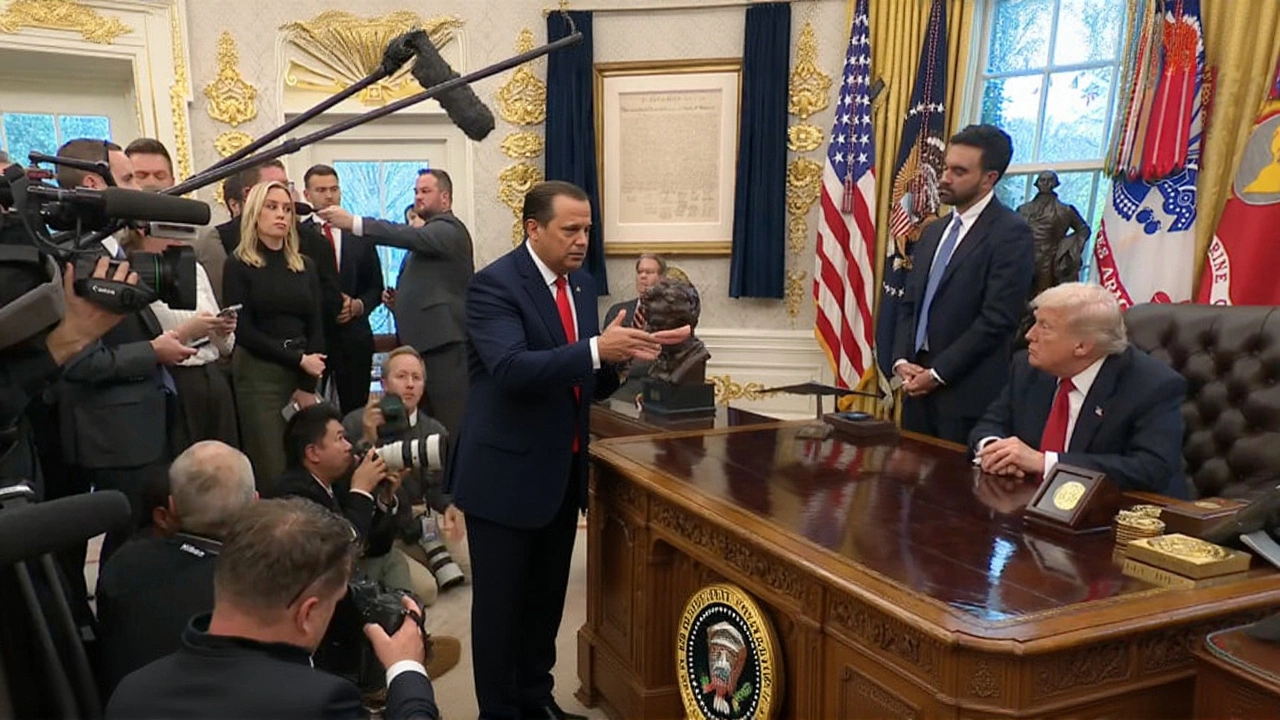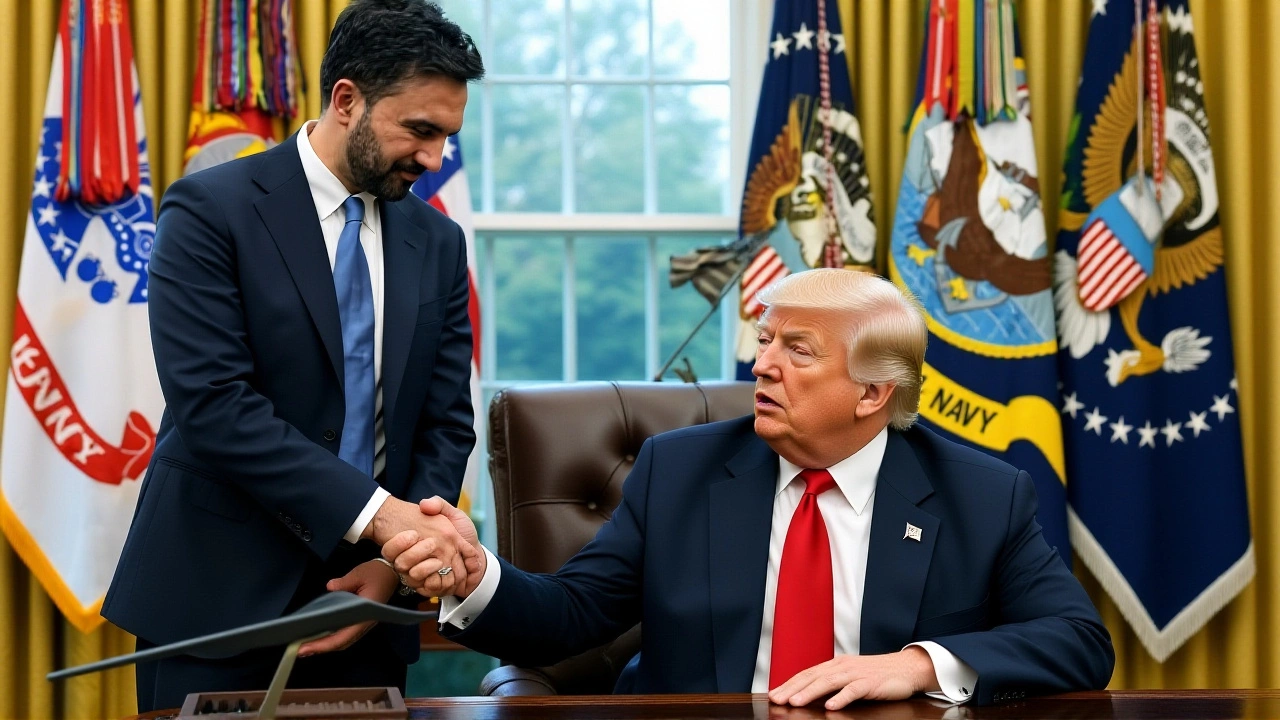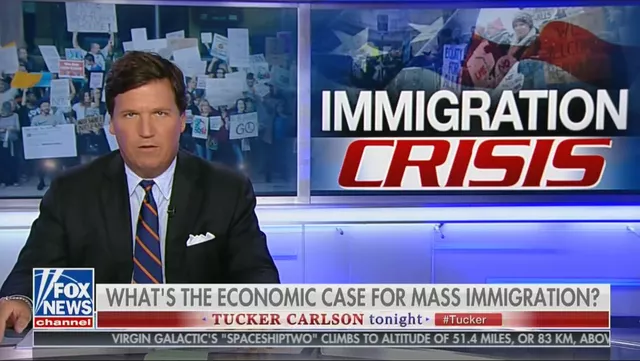When Donald J. Trump and Zohran Kwame Mamdani sat down across the Resolute Desk in the Oval Office on November 22, 2025, few expected the tension of the past year to dissolve so quickly. Just months earlier, Trump had called Mamdani "a communist" on Fox News. Mamdani, in turn, had labeled Trump "a fascist" and "a deficit" in city council hearings. Yet here they were — not shouting, not sniping, but negotiating. The meeting, arranged quietly by White House staff and the mayor-elect’s transition team, marked a startling pivot from political warfare to pragmatic partnership.
A Shift from Rhetoric to Real Estate
The conversation didn’t begin with ideology. It began with rent. According to CBS News correspondent Liz Landers, who was present, Trump opened by asking Mamdani how many new housing units he planned to approve in the next 18 months. Mamdani cited a target of 120,000 — a number that visibly surprised the president. "I thought you’d want to slow it down," Trump said. "Turns out you want to build faster than I thought." Trump then revealed he’d been reviewing New York City’s zoning laws and was open to federal incentives for developers who committed to affordable units. "We can cut red tape on federal land near transit hubs," he said. "If you cut your local permitting time in half, I’ll waive the environmental review delay for projects over 200 units." Mamdani nodded. "That’s exactly what we need." The discussion expanded to energy. Trump mentioned Consolidated Edison by name, noting the utility’s 2024 profit margin had climbed to 14.3% — higher than any year since 2018. "You’re paying more for power than any other city in America," he said. "I can get them to cap rates for three years if you agree to fast-track their grid upgrades." Mamdani didn’t hesitate: "Do it."From Insults to Agreement
The moment that stunned reporters came when a journalist asked Mamdani if he still viewed Trump as a fascist. Mamdani started to respond, but Trump cut in. "It’s okay, you can…" he said, waving a hand. "I heard what you said. I don’t take it personally anymore." That admission was seismic. Trump had spent 2024 calling Mamdani a "radical" and "un-American." Mamdani had accused him of "fostering chaos" in urban policy. Now, Trump added: "I’ve changed my mind on a few things. He wants to see no crime. He wants to see housing being built. He wants to see rents coming down. All things that I agree with." The president went further: "I think he’s going to surprise some conservative people… and some very liberal people." The remark sent ripples through the White House press corps. For decades, Republicans had painted New York City Democrats as out-of-touch elites. But here was Trump — the GOP’s most polarizing figure — publicly endorsing a progressive mayor-elect on core economic issues. Political analysts immediately noted the dilemma: if Trump agrees with Mamdani on housing and energy, how can Republicans attack the Democratic Party as anti-business?Lebanon, Hezbollah, and Unexpected Common Ground
The conversation veered unexpectedly toward the Middle East. When MTV Lebanon’s Anthony Mashad asked about U.S. policy, Trump pivoted. "We have 20 or 21 trillion dollars," he said. "Hezbollah’s been a problem in Lebanon. Big problem. We’re working with Lebanon. We’re working with everybody." Mamdani, who is of Iranian and Ghanaian descent and has long advocated for diaspora diplomacy, responded: "We’ve seen what happens when communities are left behind. Peace isn’t just about borders — it’s about jobs, schools, dignity." Trump paused, then said: "You’re right. That’s something we have in common." It was the first time either had publicly aligned on foreign policy — and the first time Mamdani had spoken to Trump without a microphone between them.
What This Means for New York — and the Nation
The implications are layered. For New York City, this could mean faster permitting, lower utility bills, and more affordable units — potentially impacting over 1.2 million renters. The city’s median rent hit $3,420 in October 2025, up 18% since 2022. If Trump’s federal incentives materialize, the city could add 40,000 new affordable units by 2028 — a number that would reduce pressure on rent-stabilized housing. For national politics, it’s a bombshell. Trump’s endorsement of Mamdani’s housing agenda undermines the GOP’s narrative that urban Democrats are hostile to growth. Conservative commentators like Charles Hurt of The Washington Times called it "the most dangerous bipartisan moment since the 1996 welfare reform." Meanwhile, progressive groups are divided. Some, like the NYC Housing Justice Coalition, celebrated the deal. Others warned: "Don’t let Trump take credit for policies we fought for."What’s Next?
No formal agreement was signed. No press release was issued. But both sides confirmed they’ll meet again before Mamdani’s January 1, 2026 inauguration. A joint task force on housing and energy is expected to be announced by December 15. Trump hinted at possible federal grants tied to local performance metrics. Mamdani’s team is already drafting a "New York Compact" — a blueprint for city-federal collaboration. The real test? Implementation. Trump has a history of abandoning local deals when they become politically inconvenient. Mamdani, at 34, is the youngest mayor in NYC history — and faces fierce opposition from the City Council’s old guard. But for now, the Oval Office felt less like a battleground and more like a negotiation table. And that, more than any policy detail, is what’s changed.
Background: The Road to the Oval Office
The feud began in March 2024, when Mamdani, then a city council member, criticized Trump’s immigration policies during a rally in Brooklyn. Trump responded with a tweet: "Zohran the Communist is trying to turn NYC into a socialist nightmare." Mamdani fired back: "He’s not just wrong — he’s a deficit to this city. He drains resources, spreads fear, and leaves no legacy but debt." The exchange went viral. Memes, protest signs, late-night monologues — all fueled the fire. By summer, Trump had banned Mamdani from speaking at Republican fundraisers. Mamdani refused to attend any White House events. Then came the election. On November 5, 2025, Mamdani won the mayoral race with 54% of the vote — the highest margin for a Democrat in NYC since 2009. Trump, watching from Mar-a-Lago, reportedly muttered: "He’s going to need help. And I’m the only one who can give it."Frequently Asked Questions
How does this affect New York City renters?
If the proposed federal incentives are enacted, up to 40,000 new affordable units could be built by 2028, potentially lowering median rents by 8–12% in high-demand neighborhoods. The agreement also includes a three-year rate cap on Consolidated Edison, which could save the average household $420 annually on energy bills — a critical relief for over 60% of NYC households spending more than 30% of income on housing and utilities.
Why did Trump change his tone toward Mamdani?
Trump’s shift appears driven by pragmatism, not ideology. He’s facing declining support among suburban voters concerned about housing costs, and Mamdani’s housing plan aligns with his own 2024 campaign promise to "fix the housing crisis." Internal White House polling showed 61% of independents believe Trump is "out of touch" on urban issues — this meeting was a strategic recalibration to reclaim that demographic.
Is this a sign of broader bipartisan cooperation?
Not necessarily. This is a localized, issue-specific deal — not a policy realignment. Trump has no interest in cooperating with Democrats on climate or healthcare. But for housing and infrastructure — areas where cities like NYC are in crisis — the political cost of obstruction may now outweigh the benefit. It’s a tactical truce, not a peace treaty.
What role did Consolidated Edison play in this deal?
Consolidated Edison is central. Its 2024 profit margin of 14.3% drew Trump’s attention as evidence of overcharging. The proposed deal would freeze rates for three years in exchange for federal approval of $1.2 billion in grid modernization projects — a win for both consumers and the utility. The Edison Electric Institute, which represents investor-owned utilities, has signaled cautious support, noting the model could be replicated in other cities.
How might Republicans respond to Trump’s endorsement of Mamdani?
Some GOP figures, like Senator Josh Hawley, have already called Trump’s stance "a betrayal of conservative principles." But others, including House Speaker Mike Johnson, are quietly encouraging local Republicans to engage with Mamdani’s housing plan — recognizing that opposing affordable construction could cost them suburban votes. The party is now split between ideological purists and pragmatic centrists.
What’s the timeline for implementing these changes?
A joint task force will be formed by December 15, 2025, with the first policy draft due by January 15, 2026. Permitting reforms could begin as early as February, while federal funding for housing projects may be allocated in the FY2027 budget. Energy rate caps would take effect upon signing — potentially as soon as March 2026. No formal deadlines exist, but both sides have signaled urgency.











